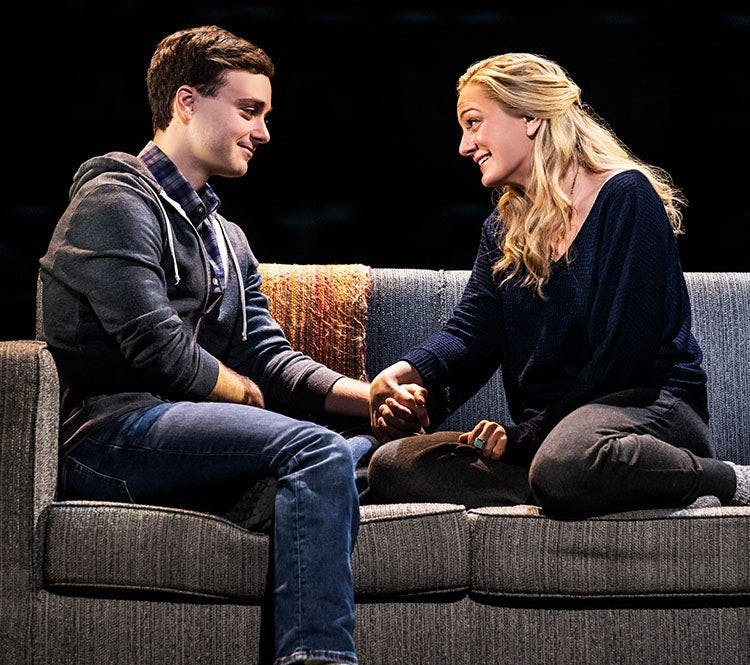In eighth grade, I stumbled upon a show I had never heard of but was being revered online as the next classic musical, I listened to the full show, following along with the storyline in the plot section of the musical's Wikipedia page, and fell in love with it. "Dear Evan Hansen" was the musical that kickstarted my love and slight hyper fixation on musical theater.
While I had the pleasure of seeing the show on Broadway in 2018, I was excited to see this with the new eyes of a rising sophomore in college rather than a rising sophomore in high school.
The setting on the stage of Cobb Great Hall was the same as the Music Box Theater in New York, and it was just as effective in setting the story as it was then. Screens hung down on every part of the stage, depicting social media timelines, showing the social media age has so much pull in the storyline. The interconnectedness of social media symbolizes the connectedness of the characters due to the tragic suicide at the beginning of the show.
Connor Murphy takes his own life, pushing the plot when Evan Hansen lies about being Connor's best friend to make his family feel better about their son's life when he was alive. Social media and the internet play a large part in the theme of the song "You Will Be Found."
Another technical aspect I locked focus on throughout the show was the lighting, which constantly changed with the character's moods being displayed, whether they were feeling loneliness and panic with bluer lighting, or a feeling of hope, with yellow tones.
The staging of scenes was also effective in songs such as "Waving Through a Window," where characters are purposely moving around and ignoring Evan to represent the character's isolation.
This show is unique to me because my favorite scenes do not actually lead to the musical side. The book, written by Steven Levenson, is phenomenal, in my opinion, dripping with emotion, and it holds most of the integral plot pushers rather than the songs. Many of the takeaway scenes for me were between Heidi Hansen, the mother of Evan, and Evan, both when they are at odds with each other, as well as comforting one another.
The first monologue given by Evan, played by Stephen Christopher Anthony, set the stage for the rest of the story, portraying how the character fixates on awkward situations and his insecurity in not only himself but his interactions with others. Not only did Anthony's acting chops behind the awkward and frightened persona impress me, but his supreme vocal skills made him equally as effective as Michael Lee Brown was on Broadway when I saw him stand in as Evan.
I also thought Anthony gave a very funny delivery of his comedic lines most of the time, which the audience desperately needs from a character that is seen in such a depressing light most of the show. However, his words were not the only thing that stood out to me, but his body movement. Every actor I see play Evan has found ways to represent anxiety ticks, and Anthony's face touching and eyebrow wiping were prevalent throughout every stressful scene, only making the acting more realistic.
Anthony also used the body language of a liar, keeping himself closed off from the people he was lying to throughout the show. There were also many times throughout the show where the actor was shedding real tears. Anthony played the character more emotionally than I had seen other actors play, which I think is true to the character written; riddled with anxiety and panic most of the show.
The most chilling moment of this anxiety being depicted is when the Murphy family is running around the stage, panicked about the released suicide note, and Evan is stagnant in the middle of this chaos, unable to come to terms with his lie and the gaslighting he put this family through.
His best acting moment was in the "You Will Be Found" sequence when all is silent around him before his speech. I couldn't take my eyes off him during this deeply emotional scene.
Another actor who stood out to me was the understudy who went on to play Cynthia Murphy for the night, Keely Vasquez. One thing I love about this show is that the parents of the main characters are developed, unlike many other shows that center around the drama of teenagers, such as "Bare" or "Spring Awakening."
I had never been too emotionally connected with this character until Vasquez played the character, even finding me crying at a new part of the show where the Murphys are revealing to Evan that Connor committed suicide. In the story, Evan writes a letter to himself as part of his therapy, and Connor finds it. Later that day, Connor kills himself with Evan's letter still on him, leaving the family to believe the two were friends. In the aforementioned scene, Cynthia exclaims the letter that Evan wrote instead of their son is all they had left.
Another character that stood out to many was Connor Murphy, who I had actually had a connection with before. I got to watch Nikhil Saboo open his Broadway debut as Kevin G in "Mean Girls: The Musical" when he was in the ensemble in the Broadway cast. That night I got to take a picture with him and chat with him at the stage door. It was amazing to see him grow from a swing and ensemble member to an emotional lead in this show.
“I’m really, really impressed with Connor…I thought his physicality was really amazing,” said audience member Cathy Barrette.
Another character I thought was a strong actress was held by many as their favorite was Zoe Murphy, played by Stephanie La Rochelle.
She has so much emotion and development throughout the show,” a young audience member and longtime fan of the show, Audrey Dekoninck, said.
I think the most prevalent of Rochelle's acting skills is in the song "Requiem," where the Murphy family dynamic is on display, and the character is able to show the cognitive dissonance that comes with grief. I think her actions in the Finale in her last conversation with Evan and her forgiveness also gave depth to her character.
“She was so willing to kind of forgive…and meet with (Evan) after all of this stuff that (he) put them through and acknowledged that while it was a hard thing, it helped them as a family," audience member Denise Elowksy said. "I liked her because she kind of was that person that was battling his own demons, and didn’t punish him for that.”
I also thought that the father of the Murphy family was more developed as a character in this version, played by John Hemphill. The part in "You Will Be Found" when the father finally leaves the denial stage of grief and falls to the floor crying always leaves me with tears.
Support student media!
Please consider donating to The State News and help fund the future of journalism.
However, the song that gets the most tears from me has always been my favorite: "Words Fail," where Evan finally comes to terms with his lie when the Murphy family learns the truth.
“I do really like ‘Words Fail,’" Elowsky said. "I always think that one’s really touching and moving, gets you to the soul right there because it’s somebody who…did everything for reasons that made sense for them at the time, but they knew it was wrong the whole time they were doing it, but it just felt right.”
I think one of the most powerful orchestrations in this show is the juxtaposition of the hopeful note at the end of "Words Fail" when Evan is done telling this lie even when it is a sad moment, and the darker note at the end of "You Will Be Found," which is supposed to be an inspiring moment but clouded by the overarching lie.
This show has always brought me great inspiration to listen to with its impeccable storytelling and left me with lessons on the human condition, both selfish and emotional, depicting a protagonist with truly human and complicated qualities.
“It really hit on a lot of topics that need to be talked about and discussed…like you don’t know what other people’s demons are kind of thing, so be kind, listen to people, take people at their best even when they’re maybe showing you their worst, and just to care about one another," Elowsky said.
"Dear Evan Hansen" at the Wharton Center held the same weight for me as it did on Broadway, carrying the same emotional depth, making me cry and laugh.
Discussion
Share and discuss “Up for review: 'Dear Evan Hansen' at the Wharton Center” on social media.







